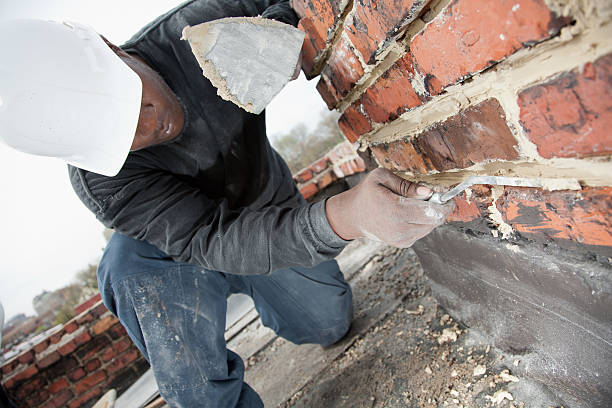Specialist Step Repair Services: Make Certain Safety And Security and Resilience
Specialist Step Repair Services: Make Certain Safety And Security and Resilience
Blog Article
Opening the Secrets of Lasting Stonework Construction Practices for Eco-Friendly Structures
Amongst the myriad approaches to environmentally friendly structure, sustainable masonry construction stands out as a tried and true and durable method that holds a wide range of untapped potential. From the choice of materials to cutting-edge building techniques, the keys to achieving sustainability within masonry building are diverse and fascinating.
Benefits of Sustainable Stonework Construction
Accepting sustainable masonry building practices not just minimizes ecological influence yet likewise offers long-term economic advantages to builders and communities. By using products like recycled blocks, blocks, and stones, home builders can considerably decrease the carbon impact of their projects while promoting resource efficiency. In addition, sustainable masonry construction strategies, such as appropriate insulation and thermal mass buildings, can improve power efficiency within buildings, bring about lowered operational expenses gradually.
Furthermore, the longevity and strength of stonework structures add to long-lasting economic benefits. Buildings built utilizing lasting stonework techniques frequently require much less repair and maintenance, translating to set you back financial savings for building contractors and homeowner. The longevity of masonry products likewise ensures that frameworks remain secure and safe, minimizing the need for frequent restorations or replacements.
Eco-Friendly Stonework Materials
Making use of environmentally friendly stonework products is a pivotal action in the direction of enhancing the sustainability of building and construction methods and minimizing ecological effect while making the most of long-term financial advantages. Lasting masonry materials are sourced, produced, and used in a fashion that reduces total ecological influence. Materials such as recycled bricks, redeemed stone, and lasting cinder block are ending up being significantly popular selections for eco-conscious contractors. Recycled bricks, for instance, not just draw away waste from landfills but also call for less power to create compared to brand-new blocks. Recovered rock provides an unique visual charm while reducing the requirement for brand-new quarrying. Lasting concrete blocks integrate recycled aggregates and might include enhanced insulation residential or commercial properties, adding to energy performance in buildings.
Additionally, natural products like adobe, rammed planet, and straw bales supply exceptional thermal mass buildings, reducing the requirement for heating and cooling down energy. These products are commonly locally offered, advertising local economies and reducing transportation-related carbon exhausts. By selecting environment-friendly stonework materials, building and construction projects can significantly decrease their ecological impact and add to the creation of healthier, much more sustainable developed environments.
Energy-Efficient Masonry Strategies
Energy effectiveness plays an essential duty in boosting the sustainability of masonry construction methods. By carrying out energy-efficient stonework methods, builders can dramatically decrease the total power intake of a building, bring about lower operational prices and a smaller sized ecological impact. One crucial energy-efficient masonry strategy is the use of thermal mass, which includes incorporating thick products like concrete or brick right into the building's structure to soak up and store warmth. This aids regulate indoor temperature levels, minimizing the requirement for mechanical home heating and cooling systems.

Technologies in Lasting Masonry
Current advancements in lasting masonry methods have caused cutting-edge methods that are improving the construction sector. One such advancement is the advancement of self-healing concrete, which utilizes microorganisms embedded within the concrete to recover splits autonomously. This development not just reduces upkeep expenses yet also improves the durability of masonry frameworks, adding to their sustainability.
Another remarkable development is making use of recycled aggregates in masonry building and construction - masonry contractor. By incorporating materials such as smashed ceramic waste or recycled glass into concrete blends, builders can decrease the ecological effect of construction tasks while maintaining structural honesty. This practice not only draws away waste see here from landfills but also conserves natural sources, making it a crucial development in sustainable masonry building and construction
Moreover, the integration of electronic layout tools, such as Structure Information Modeling (BIM), is transforming the method masonry frameworks are intended and constructed. BIM permits even more specific estimations, minimized product wastage, and improved energy performance, eventually bring about more sustainable building techniques. These innovations collectively represent a promising future for lasting stonework building in the era of eco-friendly structures.
Future Trends in Masonry Sustainability
With the ingenious strides made in lasting masonry methods, the future patterns in stonework sustainability are poised to additional reinvent the building sector. One of the vital patterns shaping the future of stonework sustainability is the increased integration of modern technology. Innovations such as Building Details Modeling (BIM) and online fact simulations are being made use of to optimize stonework building processes, leading to lowered material waste and enhanced power effectiveness in buildings.
Moreover, the growth of unique sustainable materials is set to play a significant function in improving the eco-friendliness of stonework building and construction. masonry contractor. Developments like self-healing concrete, recycled accumulations, and bio-based binders are getting traction for their ability to lessen ecological effect while preserving structural honesty

Final Thought
In final thought, sustainable masonry building techniques use countless advantages for environmentally friendly buildings. By utilizing eco-friendly materials and energy-efficient strategies, masonry can contribute to a more sustainable constructed atmosphere. Technologies in lasting masonry are continuously being established to further improve the ecological get redirected here performance of structures. Looking towards the future, the fad of stonework sustainability is anticipated to grow, leading to more eco-friendly and energy-efficient building techniques in the years ahead.
Report this page